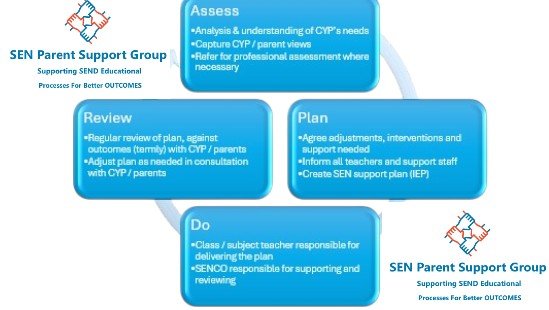If you suspect your child is struggling, delaying the Assess-Plan-Do-Review (APDR/Graduated Approach) cycle isn’t an option, for our SEN Children it’s an emergency. Without a formally logged APDR, your child faces escalating sanctions, missed interventions, and the creeping damage of constant misunderstanding.
The High Price of Delay
Continued behavioural sanctions
Schools often resort to detentions, loss of privileges or exclusions when a child’s needs go unassessed. Each sanction chips away at their confidence and sense of belonging.
- Academic misunderstandings
Without early identification, teachers mistake processing delays or sensory issues for laziness or defiance, fuelling a cycle of mislabelling that can slip into permanent school records. - Emotional and social fallout
Isolation from peers, anxiety about school routines, and the stress of “getting it wrong” every lesson add up. Long-term, this can translate into chronic attendance issues and self‐esteem that flatlines.
APDR: Your Statutory Safeguard
The graduated approach Assess, Plan, Do, Review is not a “nice-to-have.” It’s your child’s lifeline and the school’s legal duty under the Children and Families Act 2014 to:
- Identify specific barriers to learning (Assess)
- Co-produce a clear support plan with you (Plan)
- Deliver targeted interventions and reasonable adjustments (Do)
- Evaluate and revise every term (Review)
Failing to log each cycle is not only poor practice; it’s a breach of statutory guidance that can be challenged at tribunal. Also it is important to know that you do not need repeat cycles to apply for a EHCP (Education Health and CARE Plan) needs assessment, one is enough!
Equality Act 2010: Reasonable Adjustments as Rights
Under the Equality Act 2010, children with disabilities including many with SEN have a right to reasonable adjustments to remove barriers in the classroom. Schools must:
- Anticipate where a disabled pupil may face disadvantage
- Provide auxiliary aids or services tailored to the individual
- Avoid discrimination in behaviour or exclusions
Use this legal framework to demand action before waiting for an Education, Health and Care Plan. If adjustments aren’t in place, you can pursue a disability discrimination claim.
SEND Code of Practice (6.44–6.99): Schools Must Take Concerns Seriously
Sections 6.44 to 6.99 of the SEND Code of Practice set out how schools must respond when you raise a concern:
- 6.44–6.49: Early identification and graduated approach triggers
- 6.50–6.59: Roles of SENCOs and collaboration with parents
- 6.60–6.99: Monitoring, recording interventions, and periodic reviews
When a parent flags poor progress or differentiated presentation ‘Behaviour’ (I personally hate that word with a passion) the headteacher and governing body are obliged to convene the APDR cycle without delay. Ignoring parental concerns here is not an oversight it’s statutory non-compliance.
On the Horizon: New SEND Reform
The government’s forthcoming SEND White Paper due autumn 2025 promises system-wide overhaul:
- Greater early intervention resources in mainstream schools
- Clear definitions of “inclusion” and expectations for support
- Strengthened accountability for local authorities and schools (this is the one that concerns us all)
Staying ahead of these changes arms you with fresh levers to demand high-quality, timely provision. Help us submit REAL Feedback collectively complete our questionnaire about your experiences. Click here: Group Questionnaire for White Paper Response
Waiting isn’t an option. Start the APDR process today by:
- Writing to your school’s SENCO referencing the Equality Act 2010 and CoP 6.44–6.99 Letter Here: SEN Parent Resource Hub | Tools, Guides & Support
- Requesting an APDR meeting in writing, with a clear timeline for each stage
- Sharing your experience in our parent network to build pressure and spotlight delays Join Here:
Together, we turn delay into decisive action. Our children deserve nothing less.
Further Reading & Resources
- SEND Code of Practice 0 to 25 years (Sections 6.44–6.99)
- Equality Act 2010 & SEND guidance for schools
- DfE SEND reforms timeline and White Paper preview
Let’s not wait until they break. Initiate APDR now.
SEN Parent Resource Hub | Tools, Guides & Support For access to our Resource Hub where you will find over 200+ tangible resources to support your journey, choose a file from below & subscribe to access all areas including 8 CPD Accredited Parent Training Webinars!
Understanding SEND
Communicating With School
All Things EHCP
- LETTER: LA Failure To Notify If Issuing the plan
- RESOURCE: Moving Local Authorities
- LETTER: Mediation Agreement – LA agreed to issue/amend EHCP but hasn’t provided draft within 5 weeks
- LETTER: Refusal To Assess Won and LA Not Notified of EP Assessment Within 2 wk Timeframe
- LETTER: To LA – After Tribunal – Refusal to Issue. No Draft plan within 5 week timeframe.
Attendance, Exclusions & Sanctions
Complaints
- LETTER – Enforcing Interim Education S43 with LA + Escalation Letter + Tribunal Request
- LETTER: To School When Whole School Approach To Adjustments Is Not Applied Consistently (IEP or EHCP)
- RESOURCE: LGO Outcomes
- LETTER: Right to Choose Rejection 3 Step Complaints Letters
- RESOURCE: Core Deficit Supporting Tool




